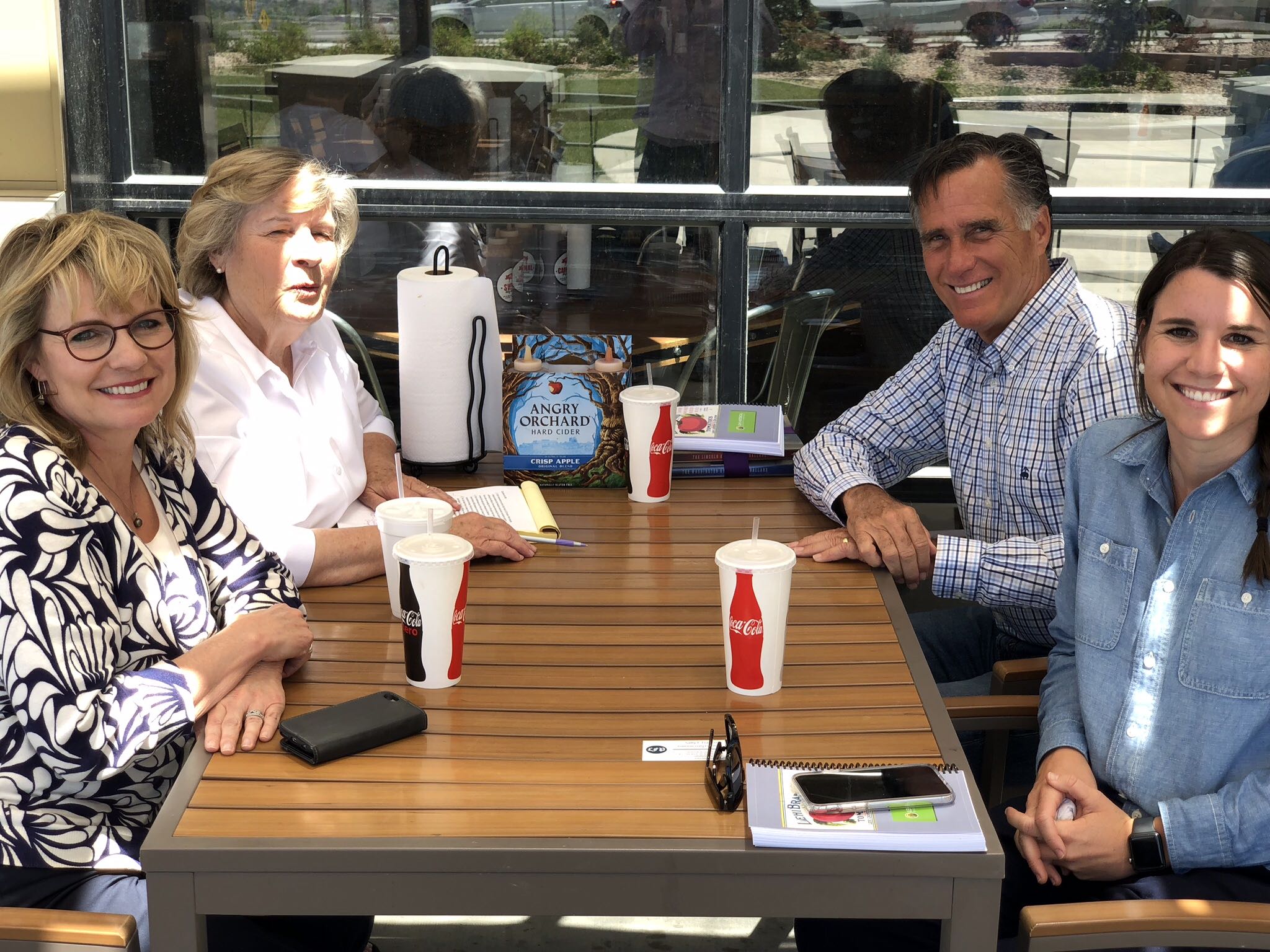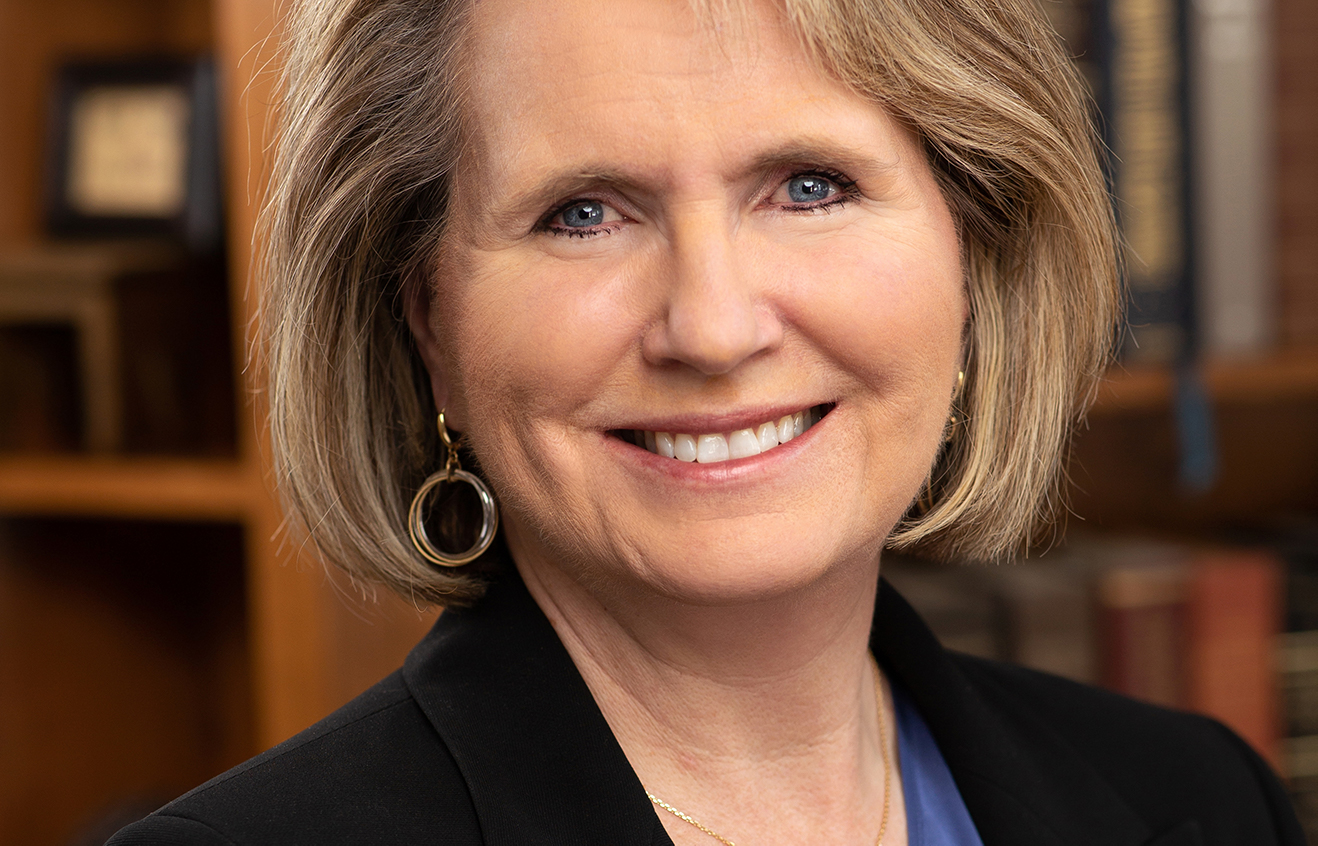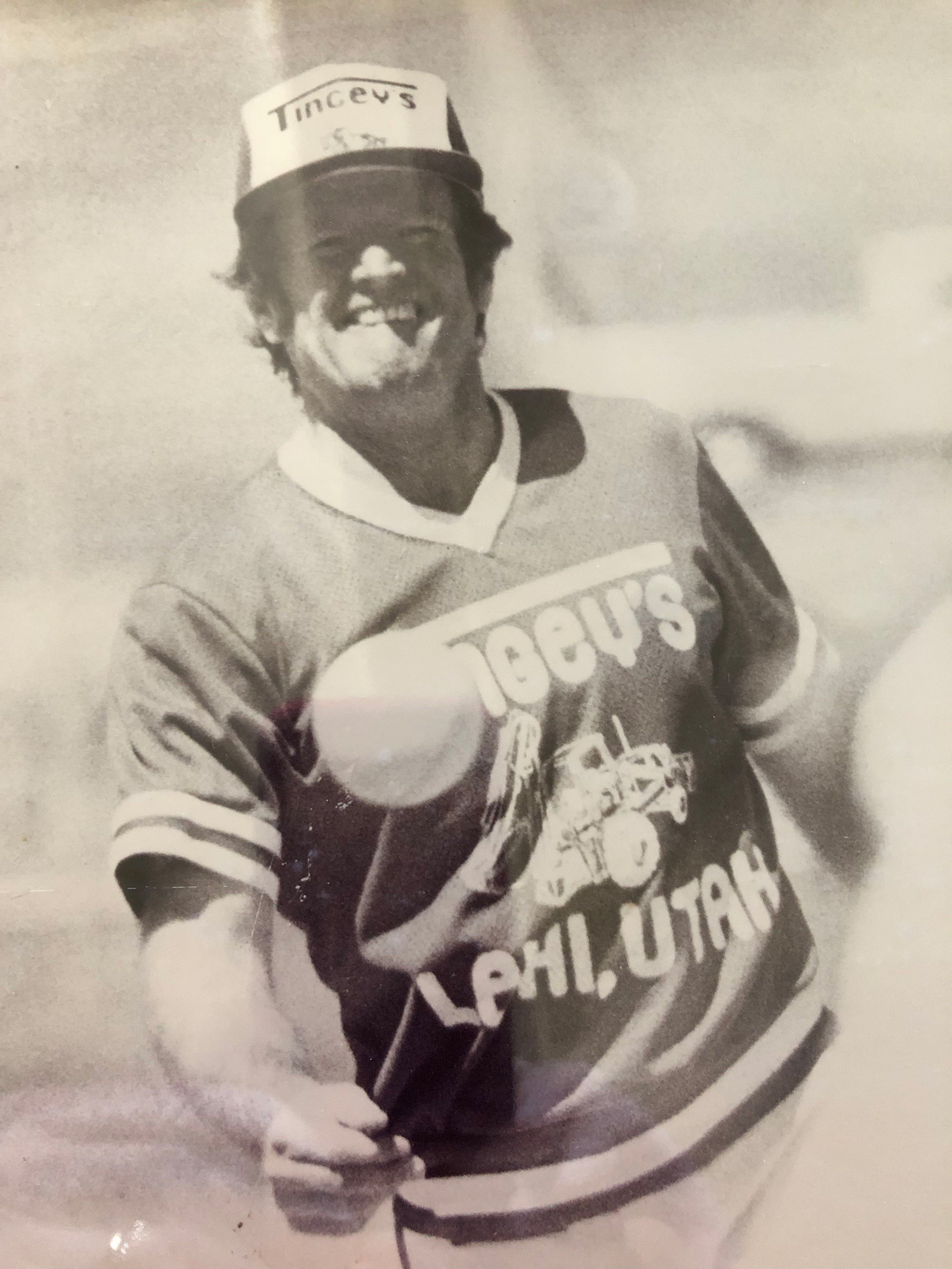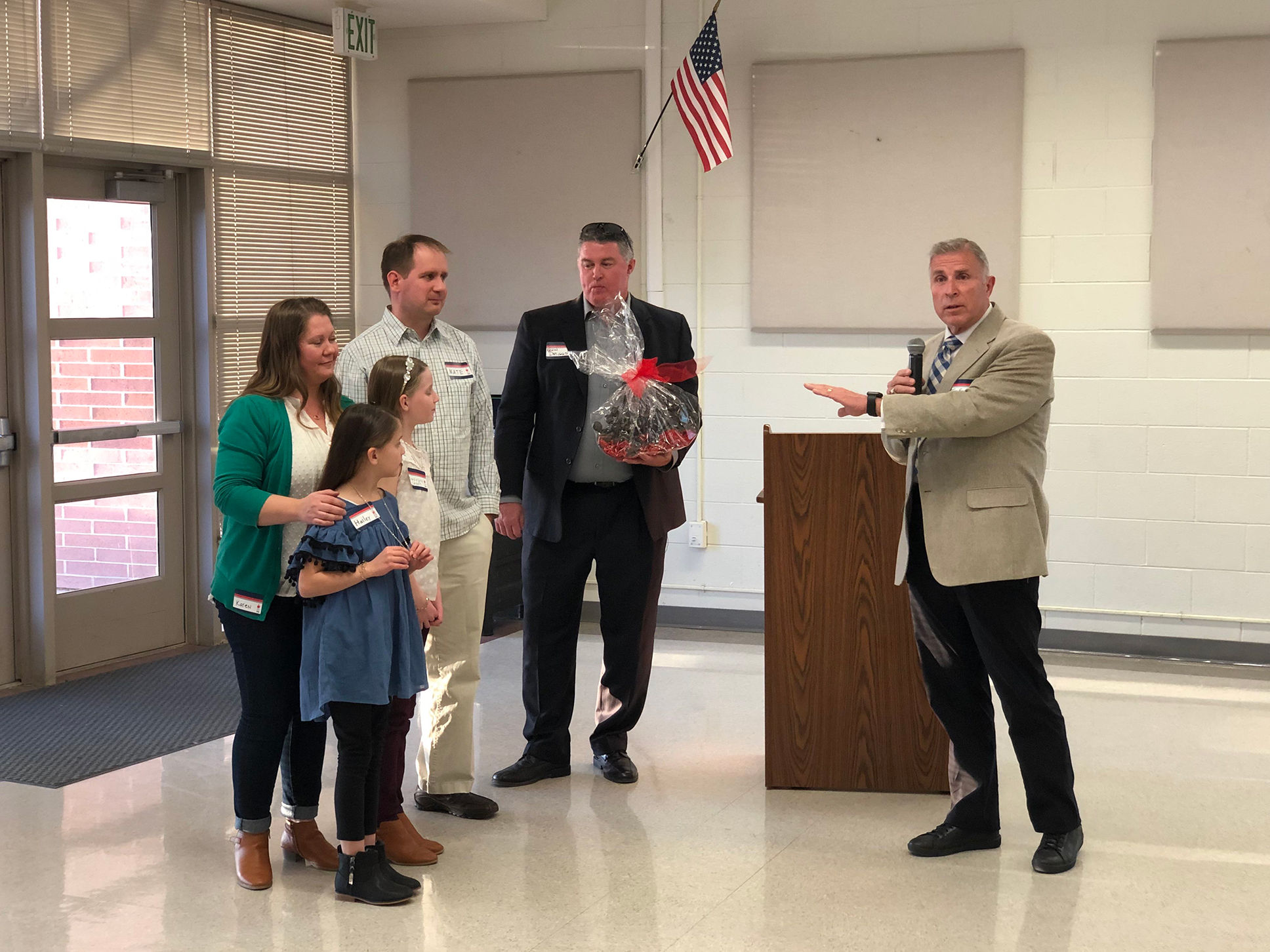Local News
Interview: Mitt Romney speaks with the Lehi Free Press
Published
7 years agoon

Topics include federal deficit reduction, healthcare, education, and the Point of the Mountain development
In early June, Mitt Romney, along with his Communications Director, M.J. Henshaw, met with Lehi Free Press Editor Donna Barnes, and Publisher, Sally Francom. The group lunched at R&R Barbeque in Lehi and discussed Romney’s Senatorial campaign, Utah, and Lehi issues.
Lehi Free Press: Let’s talk about water Mitt. We’re sure you’re aware of the Central Utah Water Project. With changing climate conditions, this federally funded water reclamation project is suffering the effects of low water levels along the Colorado River. Lower basin states — California, Nevada — need and want more of the upper basin water. How would you remedy this water grab by Nevada and California?
Mitt Romney: We have an agreement among the states–a multistate agreement on water. We’re not going to change the agreement to give them more water. We’re going to preserve our water rights and take advantage of the water rights we have. I don’t think the federal government will step in and try to change the agreement that was made among the states. So, we honor the agreement that was made among the states.
We have rights to more water from the Colorado River than we’ve been taking. California has been taking more than its share because we haven’t been taking our fair share. So we will, over time, take our full share of the water. I know, for instance, St. George in Washington county, is looking to have a pipeline going from Lake Powell into Washington County. As long as we have the rights to water, we have to take advantage of that water. Let’s not send it to California. Let’s preserve the rights we have.
LFP: Those other states are anxious to change those allocations. We know that.
Romney: I’m sure California would like to have a larger share than is agreed to. But we would like to have the share that has been agreed to, and we will protect that right.
LFP: The Utah State Prison is being relocated to an area just west of the airport, as you know. This leaves 600 valuable acres literally west of us. In your opinion what should happen with that 600 acres—green space? Housing? Commercial development? Should Utah pursue a Major League Baseball team, so we can build a state-of-the-art stadium?
Romney: You don’t want a United States senator to try and weigh in on what should be done with land in Lehi or, frankly, what the state should do with property the state might own. That’s something which should be decided by local officials and state officials. Nonetheless, as a Utah citizen, I have interest in these things as well. My very firm belief is that people at the local areas who are being affected should have the lion’s share of the voice on how land is going to be used.
Before I make a decision that has such significant economic and personal impact, if this were my own land or if this were land of a business that I owned, I would study it in some depth. I have not studied the particular property to know how it could best be used, what the alternatives are, what the implications are for the state and for Lehi, so I wouldn’t weigh in to say here’s what you should do.
All those ideas have merit. A baseball stadium, a Major League team coming to Utah would be wonderful. At the same time, open space is badly needed. And traffic issues would have to be considered. Adding more traffic to Lehi, particularly in the intersection at the Timpanogos Highway exit and SR 92 could be problematic. That’s already a real challenge. I’d have to study that before I’d make the decision if it were my land.
LFP: There is a commission in place but frankly the worry of some locals–and we’re talking about not just Lehi but Draper, Bluffdale, Riverton, Sandy–feel the composition of the legislature and those who are appointed to be on the Point of the Mountain Commission are heavy with land developers and commercial real estate developers.
Romney: Yes, our legislature is pretty heavy with developers.
LFP: Yes, it is.
Romney: I think one of the questions we must face as a state — and again this is not a federal issue, but a state issue — is how much growth do we want along the Wasatch Front? Growth means additional traffic. It means additional pollution and additional infrastructure investment and there’s probably a sweet spot, we have to decide exactly what that is.
We also have other counties in the state that are shrinking. We’ve got 11 counties that are looking for additional economic development and employment opportunities. We might want to consider ways to have, for instance, state offices or federal offices moved into some of these more rural communities that are looking for jobs and can handle additional traffic and don’t have the mountain range to block the air.
LFP: Blanding is suffering. Vernal is suffering. There are areas in Utah that are really hurting financially.
Romney: Yes, there are places like Tooele that have open space, Eagle Mountain, Nephi. There are communities that are not a long distance from our major employment areas that still have land and have economic interests in more development.
LFP: Right. Speaking of the southern part of the state, how did you feel about President Trump shrinking the size of Grand Staircase-Escalante and Bears Ears?
Romney: I think that was the right thing to do. It is still federal land. I think a lot of people presume oh, we’ve gone from federal land to now private developers, and that’s not what happened at all. It’s still federal land, under the management of the BLM. I have visited these places and there are some lovely spots that need to be preserved, and they are preserved. But there’s also massive acreage of just flat land with sagebrush.
And in my view, this was a political move taken by – first by President Clinton and then by President Obama, to lock up large portions of Utah and to say, hey, you’re not going to be able to drive on the roads, you’re not going to be able to hunt or fish or graze cattle. And that was simply an over-reach on the part of the federal government. And I think that’s a wise decision that was made to return that to normal federal land status under the BLM. And I wish we saw more effort in this regard.
One of the things I find astonishing is we have 3.2 million acres of land under wilderness area study. You could do nothing in a wilderness area. It’s meant to be totally pristine. So, we have 3.2 million acres that’s being studied as wilderness area. Some of those areas have been studied for 30 years without a designation. Only Congress can designate something as a wilderness area. But the bureaucrats say it’s a study area then impose restrictions. Nothing can happen while they’re studying it.
Congress needs to step in and say, you can have a year to study it. Or alternatively, when you’re studying it, we can still have multiple uses. And I’m someone who believes, with two-thirds of our state in federal hands, we must be able to have multiple uses on these lands. I think we, in Utah, can run our public lands better than the federal government bureaucrats in Washington, not that they’re bad people back there. They’re just not here, and they don’t have the same interests and attention we have to our own land.
LFP: We saw your TV ad last night. You’re marketing yourself as a fiscal hawk, which of course most Utahns like to hear. We’re conservative for the most part, especially fiscally conservative. What would you do as a fiscal hawk to reduce the deficit, to reduce the size of government so we don’t have these terrible debts for our children and grandchildren?
Romney: There are two parts to my answer. One is process and the other is specific reductions. Process: What we have now is the four leaders, two Republicans, two Democrats, in the House and Senate get together, create an omnibus bill which is then presented to the members and voted up or down, and the members are told, if you don’t vote for this, government closes down. That process has led to massive overspending and busting through the budget caps that have been put in place by Congress in the past. That has to change.
And I anticipate working with several senators. I anticipate gathering a group of senators and going to the Republican leadership and saying, “We’re not going to continue to vote for these omnibus bills. We’re letting you know in advance that you have to live within the spending caps. And if you don’t, we won’t vote for the bill. We insist upon amendments. We insist upon a normal process to create budgets as opposed to these omnibus bills that are pushed along as a continued resolution.” So that’s part one, process.
Part two is what are you going to cut? Two-thirds of federal spending is automatic, meaning entitlements of Medicare, Medicaid, Social Security, and interest. If you want to get the budget in balance, you’ve got to look at that area.
When I was running for president, Paul Ryan and I put a plan out that I still subscribe to, which is to say, for people 55 years of age and younger, we’re going to change Medicare and Social Security in two modest ways. One, the retirement age is going to be one to two years older because we live longer. And number two, higher income people aren’t going to get as big a growth in benefits as lower-income people.
LFP: Will there be a Social Security means testing?
Romney: The growth rate in Social Security benefits for high-income people will be a lower growth rate than it is for lower-income people. People who rely on Social Security for their living will have a higher growth rate than people for whom Social Security isn’t critical (like myself). I won’t get as much of the benefits. Even though I’ve paid into it, my benefits will be less.
LFP: So, sort of like a means testing.
Romney: It has that aspect to it. Those are those two big ones. The third big one is Medicaid, which is the health care program for the poor. And what I would do with that program is take the dollars that come to Utah and say we’re going to block grant this to Utah. It’s going to grow 2% per year. And Utah’s going to live within that 2% per year amount and care for Utah people the way Utah feels best. So, no more federal imposition of Medicaid rules on the people of Utah. I think we can run our health care program for the poor better than Washington can.
Finally get those programs in balance. And that’s the lion’s share of our spending.
Then there are other parts of what Washington does that are ineffective. I would eliminate programs and again, send them back to the states to run. Transportation dollars, welfare programs, education dollars, all these things, send them back to the state, let the state-run them in the way they think best.
We can save substantially by eliminating programs from Washington, send them back to the states, and let states manage those programs themselves.
LFP: What about important federal programs that help, like special education and the school lunch program?
Romney: Title 1 funding?
LFP: Yes, Title 1. Would you be willing to preserve those or just say, “states, it’s yours, take it and run with it?”
Romney: You must look at every single program and decide which ones are best administered at the state level. My inclination is by and large send things to the states, but they have to have metrics that they have to beat. For instance, with Obamacare, I would eliminate Obamacare, return the dollars to the states and say, “you care for your uninsured the way you think best.” However, you have to make sure people who are already insured keep their insurance. You have to make sure people with pre-existing conditions are able to buy insurance. And you have to get your population entirely insured. So, you tell the state what they have to do, but then you let the state figure out the best way to do it, with the right kinds of incentives.
Right now, for instance, with Medicaid, Utah would like to have a work requirement for people on Medicaid. I think that’s a great idea. The federal government isn’t so sure they want to do that. That’s not part of the federal program. Well, let us try it our own way. I think we will do a better job in providing care for people.
LFP: How can we create a system, even federally, where the inequities in the health care system are not so great? We have a sister who was treated at MD Anderson in Houston for cancer and was cured. We had another sister who was treated for cancer in Tennessee, and she is no longer with us. In those experiences, we found there was no leveler. There is no standard.
Romney: It’s remarkable, isn’t it, in health care that it’s still kind of a mystical black art? There’s not the kind of information that allows people to make the best decisions. I find it extraordinary. I think that’s the place where the next big leap in technology will be focused, which is on providing people information for quality health care.
But let’s go back to your question. And I’ll tell you what, one of the things I’m infamous or famous for having put in place was something called RomneyCare in Massachusetts. I can tell you that our plan saved lives. I know people personally whose lives were saved. When I go back to Massachusetts from time to time — I’ve got family there — inevitably someone comes up to me and says, because of your health care plan, my life was saved. And I’m pro-life, not just for the unborn but for the living as well.
But one part of our plan the people are familiar with is that we required hospitals and doctors to publish their prices for the things they did. And the hospitals were required to show their re-infection rate, their re-admission rate for each condition. So if someone had bypass surgery, a triple CABG for instance, we would rate all the hospitals and providers with one, two, three or four stars based upon their success rate. And they had the price. So the consumer could now look and say, oh…
LFP: They could shop.
Romney: They could shop. And then the next step was to give people an incentive to shop, which is with a health savings account or a health care policy where you pay a percent of your bill, not a deductible. So now you’re going to look and shop. We found, for instance, that Massachusetts General Hospital got four stars for bypass surgery, but Lahey Clinic also got four stars for bypass surgery. But Mass Gen cost twice as much as the other. It’s like “aha.” So now, I’m going to take my dollars to the lower cost, high-quality alternative. When you get health care to start acting like a market, you’re going to finally see more, if you will, consumer-driven quality improvements and cost improvements.
By the way, I should tell you about my prior life, before I was a governor. Before I was in politics, I was at the Olympics. Before that, I was in private equity and invested in healthcare companies. But before that, I was head of the healthcare practice for a consulting firm, and we worked with hospitals to help them compare the cost of doing various surgeries with other hospitals around the country.
And the shock to me was that a hip replacement, for instance, in some cases was three or four times more expensive in one hospital than another. And oftentimes, the lower-cost hospital had a better success rate.
LFP: That information is really important, and it’s something we need to know.
Romney: When I get sick, I call around to find out who has the best success rate. Many people don’t know how to go about doing that.
LFP: Utah is notoriously one of the nation’s lowest-funded states educationally. Some Fortune 500 companies are reluctant to relocate to Utah because of our lower per-pupil education funding. Some may not believe that, but we’ve heard that out of their own mouths. Would you be in favor of a tax hike for education? How would you address the teacher shortage and the fact that teachers now don’t want to work, in some cases, in Utah and they will leave the state or the fact that Utah has the lowest per-pupil spending levels on education?
Romney: Well, I would focus less on the spending level per pupil, less on the average classroom size and more on how we compare with other states in terms of the quality of education; the performance of our young people. The NAEP exam is not a perfect scorer, but it’s nonetheless a measure. California, where a lot of these companies are currently thinking of leaving, scores number 47 out of 50 states on the NAEP exams. The NAEP exam is fourth grade and eighth grade in English and math testing, so four tests.
Massachusetts, by the way, is number one on all four exams. And I believe there’s a reason for that and a logic for that. In Massachusetts, we tested our kids every year. We had a statewide curriculum that was created at the state level. We found over [time] that the key to education was not what we expected. We thought it was average classroom size. So, we looked at the average classroom size of each district and the performance of the students, and there was no relationship.
We spent some time with the McKinsey Institute reading their work. They’ve studied schools all over America and all over the world, and they came to a shocking conclusion. The difference between the best performing schools and those that weren’t doing terribly well, was the quality of the teachers. In the very best schools in the country and the best states and the best cities and the best countries in the world, (and that included Singapore, Finland, South Korea) the very best school systems hired teachers from the best performers in college. And the places that aren’t doing so well were hiring from the bottom of the class coming out of college. You get what you pay for.
When I was serving as governor, the predecessor governor said, we’re going to try and hire the very best teachers and have a career path for teachers that they find engaging and interesting, so they want to stay in teaching. That way, the very best teachers don’t leave but instead, continue to participate in education.
My view is that increasing starting teachers’ salary is one of the most important single things one can do to attract the best and brightest into the profession. And respect and admiration for this profession is part of making sure that schools are their very best.
So where does the money come from? I’m not going to suggest raising taxes. There may be other priorities we have in the state; I’m not looking at the state budget. If I were focusing on where to spend the money — it’s not buildings, it’s not smaller classrooms; It’s starting salaries for teachers and a career path that’s attractive for teachers to stay in the profession.
Often what happens is the very best teachers get “promoted” into administration. It should be the other way around, right? The very best teachers should be teaching and should have a career track in teaching that makes them want to stay in teaching. That’s why they took the profession in the first place, was to be with young people and to shape their minds.
LFP: What would you say to people who say you aren’t really a Utahn?
Romney: I’ve lived here for over 10 years, a full-time resident of Utah for over 10 years. And I don’t recall anyone saying, gosh, why would we have a guy come run the Olympics that doesn’t live here? No one seemed to have any difficulty with that. I came back and helped lead a team, and we were able to, as a team, put together a wonderful Olympic experience.
But after the 2012 election, when I lost, I bought the lot next to my son Josh in Holladay and built a home. And we’ve lived here as permanent residents over those years. So, let me mention one more thing. Utah values have been part of my entire life. My parents were both raised in Utah. We were raised with those values. We came here for vacations almost every year. This is the place of my heritage.

You may like
-


Exploring Day Trips From Lehi Through Scripture
-


Lehi nostalgic Christmas gifts for sale at Historical Society
-


Lehi wrestlers win at Stansbury
-


Lehi firefighters help Santa
-


Envision Utah addresses statewide teacher shortage
-


Lehi-based App Encourages: Get fit with friends
-


Lehi City addresses water safety questions
-


Utah Women’s Walk: Honoring the women of Utah, past and present
-


Fastpitch Softball—It’s all in the (Lehi) family
-


Lehi donors recognized at ASD Foundation event

